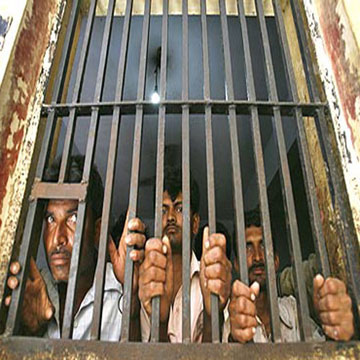 New Delhi:
New Delhi: Two unique reports on the state of prison monitoring in India which underline how a lack of review has led to alarming conditions in jails – with a huge under trial population a majority of whom are poor–were released today and bolstered by an impassioned indictment of the system by a senior academic who herself had been imprisoned.
Wajahat Habibullah, Executive Committee of the Commonwealth Human Rights Initiative (CHRI) at a national consultation here, launched the reports, Looking into the Haze: A Study on Prison Monitoring in India, and Circle of Justice: A National Report on Under Trial Review Committees on Prison Monitoring.
Mr. Habibullah, pointing to the dire consequences of unreformed prisons, said that many Kashmiri minors who had been arrested during an earlier outbreak of violence in Jammu and Kashmir a decade back had emerged as some of the leaders of the current violence. He said that this was a probable outcome of minors being held with ‘hardened criminals’ instead of juvenile detention homes as should have happened under law.
Professor Shamim Modi from the Tata Institute of Social Sciences in Mumbai spoke movingly about her own ordeal as an undertrial when she was an activist in Madhya Pradesh.
“In prison you have to accept the fact that you are not human. They put you in to set you right,” said Prof Modi. When she complained of rats biting her toes at night she was told not to expect hotel comforts. She went on to speak about health check-ups conducted in public view to humiliate inmates.
Shailesh Gandhi, the former information commissioner, pointed out that senior prison officials were often appointed with a lack of transparency. The 20 percent vacancy rate in Indian courts has led to a backlog of cases and resulted in severe overcrowding in prisons, he said. “The elephant in the room is the judiciary whose accountability is never mentioned,” he added. Mr. Gandhi went on to call for an audit of the judiciary.
Other speakers at the event included Harsh Mander, Director, Centre for Equity Studies, Maja Daruwala, Senior Advisor at CHRI and Aman Hingorani the Senior Advocate on Record at the Supreme Court, while participants included representatives of state human rights commissions and civil society organisations from around the country. The Director General of Tihar Prison, Mr Sudhir Yadav, also attended.
Participants called for the need of transparency in the penal system. For instance Prof. Modi said an effective monitoring of prisons would solve many of the problems by independent, informed and sensitive monitors.
A recent report by the National Crime Records Bureau (NCRB) on the state of prisons in India underlines the dysfunctional state of the country’s jails. Year after year, dry statistical tables, which barely make it to the media, paint a grim picture of official neglect and personal tragedy in our 1401 prisons.
The NCRB’s most recent figures found India’s 1401 jails held 419,623 prisoners when the countrywide capacity was 366,781. CHRI’s analysis of state-by-state numbers is even more alarming; some state prisons house twice as many prisoners as they can hold and a number with 500% occupancy. A look at the following statistics underlines the challenge:
• Seven in 10 prisoners in the country were either illiterate or educated only up to high school
• Nearly 70% of the Indian prison population had not yet been proved guilty
• Across the nation there was just one guard for every ten prisoners
• One medical staff for every 225 prisoners and
• One correctional staff for every 702 prisoners
Further, a prisoner dies every five and a half hours which highlights the neglect, violence and personal tragedy behind prison walls.
The valuable and extensive data and information about conditions in prisons tell a larger, grimmer story – they go directly to the heart of a space that is, for many Indians, an area of darkness. It is this that lies behind the stories of long detention, overcrowding, corruption, riots deaths and disease that are often reported.
Circle of Justice: First National Report on Undertrial Review Committees’- looks at the shortfalls in the formation and functioning of the undertrial review committees, a district level oversight body headed by a judicial officer and mandated to review and recommend release in cases of petty offence, long detentions, and in cases where statutory bail is ordained. The Supreme Court has recently brought this prison oversight body to the forefront through a writ petition titled ‘Re Inhuman Conditions in 1382 Prisons’. A key finding of our report is that only 40% of the committee meetings complied with the full mandate directed by the Supreme Court.
Looking into the Haze: A Study on Prison Monitoring in India'- is a national report that looks at the functioning of the Board of Visitors, an oversight mechanism mandated under the Prisons Act 1894 and consisting of Official Visitors and Non Official Visitors (NOVs) drawn from civil society and from significant professions and services. The BOVs are mandated to visit the jails regularly, hold meetings and report to the higher prison and state authorities. The report notes that less than 1 % of jails are monitored by this system.
 New Delhi: Two unique reports on the state of prison monitoring in India which underline how a lack of review has led to alarming conditions in jails – with a huge under trial population a majority of whom are poor–were released today and bolstered by an impassioned indictment of the system by a senior academic who herself had been imprisoned.
New Delhi: Two unique reports on the state of prison monitoring in India which underline how a lack of review has led to alarming conditions in jails – with a huge under trial population a majority of whom are poor–were released today and bolstered by an impassioned indictment of the system by a senior academic who herself had been imprisoned.